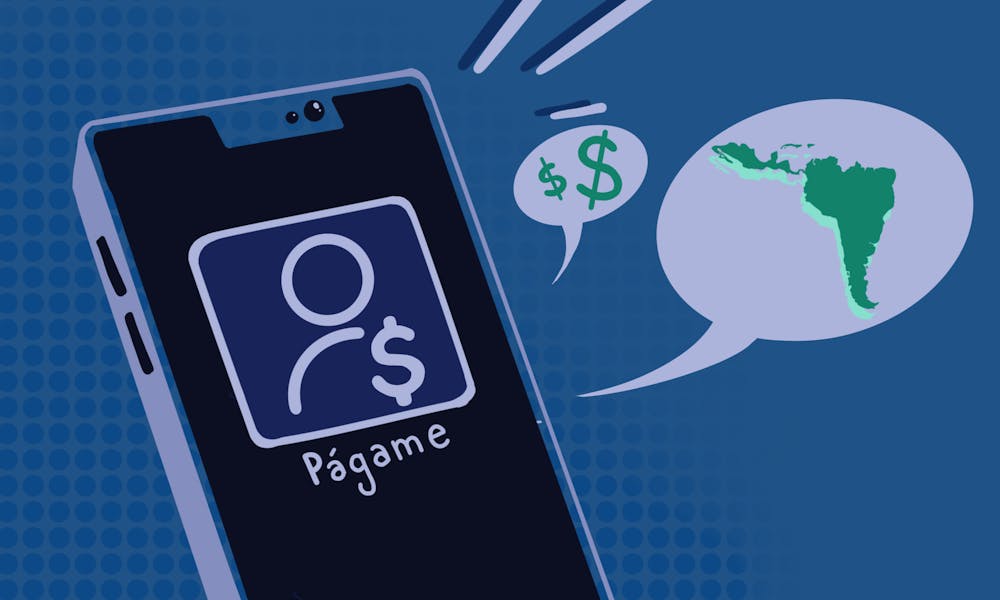Less than 50% of the Latin American population has access to basic financial services like bank accounts, money transfers, and debit or credit cards—an inaccessibility exacerbated by complicated applications and requirements. This is what inspired Juan Pablo Ramirez (W ’22), Jaime Barrenechea (W ’22), and Brendan McCaffrey (W, E ’22) to take action. Bonding over their shared love of soccer and entrepreneurship, the three juniors co–founded Págame—a fintech startup that aims to be the Venmo of Bolivia and to revolutionize the Latin American financial landscape.
Págame is an app that seeks to make peer–to–peer financial transactions simpler. "Right now, to make a transaction [in Latin America]—a simple payment that people in the United States would just associate with a username and Venmo—requires a lot of information, including documentation number, account number, name, place of residence, and much more info,” says Brendan. Págame uses data services to collect the information required for these transactions, so you only need to provide one unique identifier, like a username. The app then does the rest of the work, auto–filling the data and allowing you to transfer money to others with the tap of a button.
Juan—who grew up in Mexico, Puerto Rico, Costa Rica, Colombia, and the Dominican Republic—has always had a keen interest in Latin America's business landscape and solutions to its inequities. He believes that financial inclusion is an important tool to stimulate economic development. He's seen how apps like Venmo and Cash App revolutionized the U.S. and European economies. It was Juan who came up with the idea of a peer–to–peer payment service. He planned to start the app in Bolivia.
"Bolivia was the best place to launch this [platform] because it has an interconnected society, a high level of smartphone penetration, and a lack of larger financial players," he says.
Juan then reached out to Jaime, his friend since his first year at Penn. He thought that Jaime's business savvy and extensive knowledge of Bolivia would make him the perfect partner. However, both students didn't possess much technical know–how, an integral part of building an app. So Jaime pitched the company idea to his close friend and Zeta Beta Tau brother Brendan, whose sound financial and technical knowledge completed the trio. Thus, Págame was born.
Together, the team began working on the app. They wanted to revamp the foundation laid by existing apps in the United States and provide a fresh take. The lack of financial infrastructure in Latin America was like a blank canvas.
Brendan explains their thinking using the metaphor of cities: “If you want to make NYC better, there’s only so much you can do because the street grid is already set in stone. If you create a new city, you can optimize it in a way that NYC can never [achieve]."
However, due to the COVID–19 pandemic, the three students were soon forced to leave Pagamé’s unofficial headquarters at 4115 Walnut Street and fly back to their respective homes.
They used quarantine to develop Págame. Since many of their friends’ internships had been canceled, the trio now knew a lot of people who needed something meaningful to do over the summer. Over the break, they began expanding the team. What started off as five interns over the summer has grown into a network of students from Harvard, Princeton, Berkeley, Northwestern, and the University of Toronto.
Currently, the app is still in development, with an expected launch date in the next few months. The founders are in talks with high–level financial institutions to ensure that the app can come to the market smoothly and work for as many people as possible. They’re working with a number of mentors: Gustavo Añez Castedo, a representative of Bolivia at the World Bank; Miguel Armaza, co–founder of Gilgamesh Ventures, an investment fund focusing on the Americas; and Andrew Endicott, CFO and founder of Petal, a financial innovation startup that has raised almost $500 million in funding. The Págame team also recently received a grant from WeissFund, a student–run venture capital group at Penn, which Jaime describes as a “proud milestone.”
Going forward, each of the co–founders will continue working on Págame, on top of pursuing other professional aspirations. They hope exposure in their careers will allow them to bring finance and consulting knowledge back to Pagamé’s venture. The team also wants to expand the app's reach to Mexico, Costa Rica, and the Dominican Republic.
Juan is optimistic about their vision. “We hope to mold [Pagamé] into the best product possible and make it work—[to] be able to use the concept and expand little by little into other developing economies,” he says.
Juan, Jaime, and Brendan are quintessential 'Whartonites' passionate about entrepreneurship. But they are also staunch advocates for social change, with a mission that transcends business: to create value for themselves and for Latin America.

